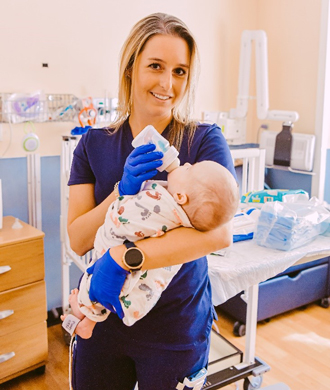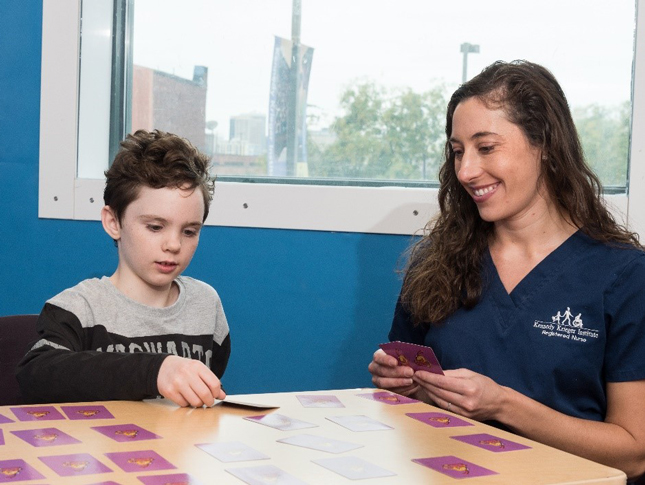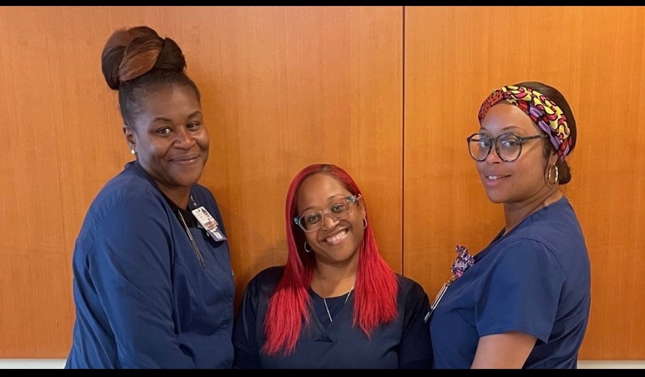Kennedy Krieger nurses play key roles in the following settings:
Inpatient Nurses
Nurses provide intensive, around-the-clock therapeutic care for children and adolescents with complex medical conditions at Kennedy Krieger’s 70-bed, specialty pediatric hospital. Nurses provide inpatient care for individuals from birth to age 25, including those requiring ventilator assistance or tracheostomy tubes, for the following (not all inclusive):
- Brain disorders and injuries, including low responsiveness
- Spinal cord disorders and injuries
- Medical fragility
- Chronic pain
- Feeding disorders
- Severe and self-injurious behavioral disorders
Inpatient nurses' role in the care of a patient starts before the patient and their caregivers even arrive. Information is reviewed by case managers. The inpatient team then coordinates the patient's treatment plan for the upcoming admission.
Upon admission, each patient is assigned a primary and associate nurse team. In conjunction with the inpatient treatment team, inpatient nurses work with the patient and their caregivers to develop a nursing plan of care, which guides the patient’s nursing care throughout the admission. Nurses monitor the patient’s progress toward the goals outlined in the nursing care plan, and adjust interventions to assist the patient and their caregivers in achieving the goals of the admission.
During the entire inpatient stay, licensed nurses are assigned to the patient for 24 hours a day to perform the interventions stated in the patient’s plan of care and to make adjustments to the plan as indicated by the patient's medical condition. Nurses are responsible for assessing the patient’s condition, administering medications, performing treatments, obtaining lab specimens, implementing interdisciplinary team protocols and providing education to the patient’s family throughout the admission, preparing them for discharge.
Licensed nurses are assisted by certified nursing technicians to provide the patient a safe environment, assist with daily hygiene needs, effectively address pain and discomfort, and ensure the patient and their caregivers are made to be as comfortable as possible in the hospital environment.
Clinical Care Managers are assigned to each patient to facilitate a patient's admission, ongoing stay and discharge plan by working with the patient’s family members, team members, referral sources and insurance companies.

The Neurobehavioral Unit (NBU)
The Neurobehavioral Unit (NBU) is a unique, 16-bed inpatient unit dedicated to the assessment and treatment of children and adolescents with developmental disabilities and intellectual disabilities who have severe behavioral problems. Behavioral problems treated on the NBU include, but are not limited to, self-injury, aggression, noncompliance, property destruction, pica, obsessive-compulsive and ritualistic behaviors, mood instability and other explosive outbursts. The treatment model consists of integrated behavioral and pharmacological interventions and the evaluation of those interventions through 24/7 data collection and analysis.
Prior to admission, senior nurses, in collaboration with other team members, review the inpatient admission packet and the patient’s medical history. Once this review is completed, a treatment plan can be developed and individual needs and necessary equipment can be identified and obtained. 
NBU nurses are a vital part of a large interdisciplinary team consisting of psychiatrists, neurologists, behavior analysts, social workers, speech and language pathologists, educational coordinators, program specialists, clinical assistants, and also the patient and their family members. Licensed nursing staff are available to develop and implement a plan of care in collaboration with the medical and behavioral teams. Progress is monitored and adjusted based on a patient’s response to treatment. Nurses are responsible for patient assessments, administering medications, obtaining lab specimens, obtaining EKGs, performing treatments, participating in the development and implementation of interdisciplinary team protocols, and providing training and education to the patient’s family throughout the admission.
Pediatric nurse practitioners (PNPs) are assigned to patients admitted to the NBU. PNPs provide daily medical management and oversight in collaboration with attending psychiatrists, attending neurologists, nurses, and other members of the interdisciplinary team. They also participate in discharge planning focused on the medical needs of the child.

Outpatient Programs
Outpatient nurses are assigned to various areas and possess expert knowledge related to disease entities, medications, and treatment needs of the patients seen. The outpatient nurse educates the patient/family regarding specific medications and treatments and serves as a resource to members of the community who are may interact with the patient and family. These nurses triage, perform nursing assessments and procedures, and assist with examinations and treatments. Additionally, the outpatient nurse provides the patient/family with discharge instructions and/or education materials, and performs medication reconciliation with patients as part of the triage and discharge process. Each of these nurses has an expertise in a variety of developmental disabilities and possesses autonomous roles that are integral to the success of the patient’s visit. Certified nurse practitioners provide care to patients in many of the outpatient clinics. They evaluate the patient and manage the specialty care needs of the patient and family.

Day Hospital (Specialized Transition Program - STP)
As part of the Specialized Transition Program (STP), nurses help students incorporate medical treatments into their school day. Nurses assigned to the STP help the student become more independent in self-care needs and educate them through health-related activities. Upon discharge, the STP nurse discusses the student’s needs and abilities with the community school nurse, enabling the treatment plan to continue in the community setting. STP nurses are a vital component of the program, ensuring the student transitions back into a school program that meets their health needs while also serving as a resource to other STP staff on health-related issues.
